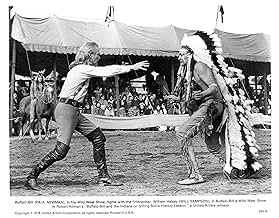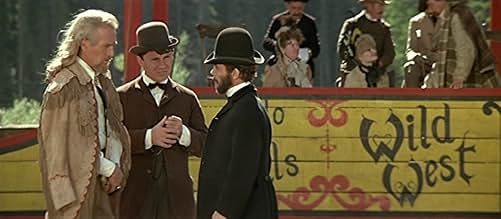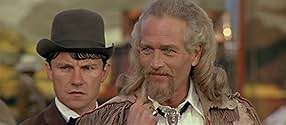Oeste Selvagem
O cínico Buffalo Bill contrata Touro Sentado para explorá-lo e adicionar sua credibilidade à visão distorcida da história apresentada em seu Show do Velho Oeste.O cínico Buffalo Bill contrata Touro Sentado para explorá-lo e adicionar sua credibilidade à visão distorcida da história apresentada em seu Show do Velho Oeste.O cínico Buffalo Bill contrata Touro Sentado para explorá-lo e adicionar sua credibilidade à visão distorcida da história apresentada em seu Show do Velho Oeste.
- Direção
- Roteiristas
- Artistas
- Prêmios
- 1 vitória no total
- Prentiss Ingraham
- (as Allan Nicholls)
- Oswald Dart
- (as Robert Doqui)
- Direção
- Roteiristas
- Elenco e equipe completos
- Produção, bilheteria e muito mais no IMDbPro
Avaliações em destaque
We meet a fantastic cast of characters, played by many of the best actors around giving wonderful performances. Among them are Joel Grey, Kevin McCarthy, Burt Lancaster, Harvey Keitel (really playing against type as Bill's goofy, childlike nephew), and Geraldine Chaplin (as Annie Oakley). Everyone, including Buffalo Bill himself, is deftly characterized in a very Altmanesque way. They wander through a semi-story, often seen and heard only in glimpses. Chaplin in particular, who gives probably the most memorable performance in the film, has very few lines. Mostly she characterizes Annie through her face. The Wild West Show is becoming more and more popular, and grossing more and more money. Their newest attraction is Sitting Bull, the man who famously defeated George Custer at Wounded Knee several years earlier. To have Sitting Bull for his show makes Bill extremely proud. In his mind, he has now defeated and subjugated the one Indian who really gave the white man a run for his money, and, by doing so, he has single-handedly tamed the West. Unfortunately for him, Sitting Bull is no subject. He has only joined the show because he has dreamed that, if in the show, he would get to meet President Grover Cleveland. We only once see Sitting Bull speak, when he attempts to talk to Cleveland. The rest of the time, his servant, Halsey (Will Sampson, from One Flew Over the Cuckoo's Nest), speaks for him. While he's participating in the show, he wants to change it in order to make it more factual.
Altman's detractors will have a field day with Buffalo Bill and the Indians. The biggest complaint against the director, as it seems to me, is that he is overly cynical and hates his characters. I'll admit that that is sometimes true, but I also think that the detractors see that aspect where it just doesn't exist. It does exist in this film, however. Buffalo Bill is most certainly a target for derision. Most of the action in the film revolves around the man being humiliated by Sitting Bull. Bill thinks he's the greatest adventurer who ever lived, and the film delights in having him showed up by the Sioux chief. I do not believe that it is an artistically invalid to have a character as the central target of a satire. Network, made the same year, has Faye Dunnaway, for instance. Who can like her by the end of the film. The difference is, I suppose, that Dunnaway wins some pathos by the end of the film. Maybe that's a difference, anyway. Buffalo Bill might have a bit of it by the end of the film, I think.
The character of Buffalo Bill is a wonderful satirical target because he really exists in such a state of absurdity. Once a genuine American military hero, Bill Cody wrapped up his entire experience and put it inside a bottle. In that bottle, the Wild West grew more and more fantastic, and less and less real. The environment is controlled, the goings on are fake, and any bit of history is freely created. It's not unfair, I suppose, to say Buffalo Bill and the Indians has a somewhat simplistic revisionist history behind it, but, in a big way, it is itself about revisionist history. Buffalo Bill Cody was revising history, creating entertainment out of true, historical human misery. And that's not only the suffering of the Native Americans, which is at the forefront of the film, of course, but also white settlers. The film begins with a rehearsal of an Indian raid on homesteaders. The bigger message is that was what Hollywood did, as well.
Bill likes his world, loves it, in fact. It is a celebration of his ego (the film often focuses on the gigantic portraits of Bill, which certainly would garner much criticism from some people and I would agree that it's not particularly subtle, but I would also say that it is pretty funny at times). Sitting Bull, one of the greatest Indian leaders and, from most accounts, an enormously clever and skilled man, completely undermines Bill's superiority as soon as he arrives. A blowhard as big as Buffalo Bill deflates pretty easily. Sitting Bull's presence also works to make Bill finally look around himself and begin to question the false world he has erected around himself. This thread of the film is resolved, at least as regards the narrative, in the climactic sequence, where Bill encounters Sitting Bull in a dream. This sequence is probably the low point of the film, I think. It more or less spells out everything that the film has been building to, and it doesn't really accomplish anything new. We know Altman for his amazing and original climaxes, and this one is certainly not one of his best. Still, it does work in a strictly functional way, and it is followed by a truly interesting and exquisite final sequence. This final sequence, which I won't discuss in this review, is not merely restating what has already come before, as I believe many viewers will take it. This, I think, is where the character of Buffalo Bill claims his pathos. Paul Newman's eyes in that final close-up are both frightening and quite sad, in any number of ways. Any film as shallow as many people like to claim this one is would never have given rise to this much depth in one man's expression. If you watch it and don't see it, I really think you've missed the point.
Even if you don't buy into the content of Buffalo Bill and the Indians, it's hard to imagine being unimpressed by Altman's direction or any of the other technical aspects of the film. Many claim it to be a bore, but I think Altman was just light years ahead of his audience at times. It's very entertaining and especially very funny at times. There are any number of masterful sequences. In my opinion, it is second in achievement only to Nashville.
The two biggest flaws, though, are these: Compared to most of Altman's films, much of the dialogue in this movie is very "stagy" and theatrical. I suppose it's supposed to be that way because of the questions of "myth" and "legend" that the story concerns itself with, but my impression was that such theatrical-sounding dialogue didn't mesh well with Altman's typically naturalistic style of filming.
The other problem I had is that the whole subject matter -- myth vs. reality, history vs. reality, show business vs. reality, etc. -- isn't really explored with any depth or subtlety. We're constantly being reminded that Buffalo Bill is a man who created his own legend out of lies, and that that is the basis of modern show business to this day, but really, that just didn't strike me as being a particularly insightful observation. This is hardly the first movie to point out that lies are often more "real" (or more attractive) than the truth, and Altman doesn't seem to bring anything new to the table.
Still, it's Altman, which means it's well-made, entertaining and beautiful to look at. I don't think this will ever be considered one of his major works but it's certainly worth a look.
The reason why Buffalo Bill sustained an enduring popularity was because he really did have a background that was colorful and exciting. He was a kid raised in Nebraska frontier territory who ran away to escape hard times and was one of the young riders for the short lived and legendary pony express. He had real exploits in that, as a buffalo hunter (hence the name)and an army scout. He won the Congressional Medal of Honor and did kill Cheyenne Chief Yellow Hand in single combat.
But a lot of people in those days could have shown similar resumes. What set Cody apart was his discovery by Ned Buntline who wrote those dime novels who created all the mythology around him. Buntline was in need of a new hero, his previous literary Parsifal Wild Bill Hickok had fallen out with him. Buntline later wrote about Wyatt Earp, Jesse James, Billy the Kid, just about every colorful character our old west produced. His dime novels for better or worse created the characters.
The greatest weakness in the film is Burt Lancaster's portrayal of Buntline. Not taking anything away from Lancaster because I'm sure he was taking direction and working within the parameters of the script and the original Broadway play Indians upon which Buffalo Bill and the Indians is based. But Lancaster plays it like the elderly Robert Stroud. The real Buntline was more like Elmer Gantry.
Paul Newman as Cody however gives one of the best interpretations of Buffalo Bill seen on film. He's a man trapped in his own legend, but he's smart enough to know what's real and what's phony in his world, including himself. He knows behind all the ballyhoo and hoopla of his Wild West Show, there's a man who did not always know ease and comfort.
The original play Indians ran for 96 performances on Broadway and starred Stacy Keach as Cody. It was far more involved and had Hickok, Billy the Kid, and Jesse James as characters. Author Arthur Koppit trimmed it down so it had more coherency for the screen.
As we know from Annie Get Your Gun, Sitting Bull was briefly part of Cody's Wild West Show. But here the attention is focused on Frank Kaquitts who in his one and only film plays an impassive Sitting Bull, who's doing Cody's show to gain food and supply from the government for his people. In fact Cody now the total show business creation is more impressed with Will Sampson who's well over six feet tall and is better typecast as the savage Indian. There's nothing terribly savage about either of them now.
Look for good performances from Geraldine Chaplin as Annie Oakley who in real life as well as in Annie Get Your Gun befriended Sitting Bull and from Joel Grey as Nate Salisbury, Cody's business partner and Kevin McCarthy as John Burke, the publicist for the Wild West Show. They continued what Buntline started in creating the Buffalo Bill mythology.
Buffalo Bill and the Indians is not the best film of Robert Altman or Paul Newman. It's certainly a lot better than the science fiction film Quintet that they did later. It's a good study of how in America our western mythology got its start.
"Tell Joy not to get on the horse in back," mutters the show's MC, Salisbury (Joel Grey) regarding an actress playing a white woman abducted by Indians. "It looks fake. We're in the authentic business." Later, Salisbury shoots down a band's idea of real frontier music as "too Ukrainian."
All this is easy to miss when so much is going on at once, while horses nearly run down a pedestrian in the foreground. This is a Robert Altman film, after all, or "Robert Altman's Absolutely Unique and Heroic Enterprise of Inimitable Lustre!" as it bills itself.
As Jeff Lebowski might say, Altman's not into that whole brevity thing here. A two-hour extravaganza, "Buffalo Bill" stars Paul Newman as Bill and makes its points about how show business and American mythmaking became one with repetitive, haymaker swings. The end result is a comedy that's not that funny and a social statement that's not that convincing, but Altman's secret sauce of a busy camera and piquant performances makes for a pleasant if shapeless affair.
Newman's something of a disappointment, giving less a performance than a caricature. I get the feeling he was directed by Altman to just play a slightly older and more pompous Hud with a goatee. He fills out Bill by drinking rotgut from a schooner, loving and spurning a succession of opera singers who never stop singing in frame, and watching over his stardom with a kind of prissy defensiveness that belies his self-cultivated frontier image. He can be a joy to watch still, working his eyes and playing to his mirror, maybe winking at the audience about what they expect from him as both Bill and Paul. If only he had better material.
"You ain't changed, Bill."
"I ain't supposed to. That's why people pay to see me."
There's also the business of his dealing with the Wild West Show's newest star attraction, Sitting Bull (Frank Kaquitts), which gives the story much of its social perspective. Bill thinks of Bull as an ungrateful pet who needs cultivation in "the show business," while Bull thinks Bill sells lies in the guise of history. Hence the "history lesson," which feels shoehorned in from a more socially committed source play. Altman wants to tell that story, but most times he'd rather have fun with the show-making part, and while you are watching this, you wish he'd cut loose and do just that.
The film succeeds in short bursts, though the eccentric casting choices Altman throws at you here don't work as well as they did in his other films. Geraldine Chaplin as Annie Oakley? Harvey Keitel as Bill's nerdy nephew? Some Altman vets like Robert DoQui and Allan F. Nicholls are barely in the film while stars like Newman, Keitel, and Burt Lancaster get longer spotlight time. John Considine is fun as Annie's flinchy husband, "the handsomest human target in the West," though that running joke, like so many others, is plugged more times than one of Annie's nickels. I was impressed also by Kevin McCarthy's publicist character, not only for the juiciness of his grandiloquent performance but the magnitude of his handlebar mustache.
"Buffalo Bill" takes a lot of time saying a good deal less than it thinks. But the spectacle of "the show business" and the minor bits of Altman kookiness and sardonic commentary around the edges keep this a diverting if underfilling entertainment.
The satire also explores the way Bill runs his show, or the way any CEO might run a company, and whether truth or entertainment is more important to the crowd. The truth Sitting Bull wishes to bring to the people is much less important to Bill than are his ticket sales. The juxtaposition of Sitting Bull's meekness and the way Bill portrays him in the show as a murderous, ruthless warrior is really brilliant.
Você sabia?
- CuriosidadesThe full-length portrait of Buffalo Bill astride his horse, that appears several times in the film, is based closely on a similar portrait by the French artist Rosa Bonheur, which hangs in the Buffalo Bill Historical Center in Cody, Wyoming.
- Erros de gravaçãoSitting Bull joined Cody's show in 1885. The performing arena shows several Wyoming state flags, but Wyoming wasn't granted statehood until 1890, and that flag wasn't adopted until 1917.
- Citações
William F. 'Buffalo Bill' Cody: My daddy was killed tryin' to keep slavery outta Kansas.
Oswald Dart: How'd he do that, sir?
William F. 'Buffalo Bill' Cody: Well, my daddy hated slavery with such a passion, that rather than let the coloreds get in to becomin' slaves, he just fought to keep 'em all out of the state.
- Cenas durante ou pós-créditosRobert Altman's Absolutely Unique and Heroic Enterprise of Inimitable Lustrel
- ConexõesFeatured in Luck, Trust & Ketchup: Robert Altman in Carver Country (1993)
- Trilhas sonorasQui sola vergin rosa
Composed by Friedrich von Flotow
From his opera "Martha"
Performed by Evelyn Lear
Principais escolhas
- How long is Buffalo Bill and the Indians, or Sitting Bull's History Lesson?Fornecido pela Alexa
Detalhes
- Data de lançamento
- País de origem
- Central de atendimento oficial
- Idioma
- Também conhecido como
- Buffalo Bill and the Indians
- Locações de filme
- Empresas de produção
- Consulte mais créditos da empresa na IMDbPro
Bilheteria
- Orçamento
- US$ 7.100.000 (estimativa)
- Tempo de duração
- 2 h 3 min(123 min)
- Cor
- Mixagem de som
- Proporção
- 2.35 : 1






































